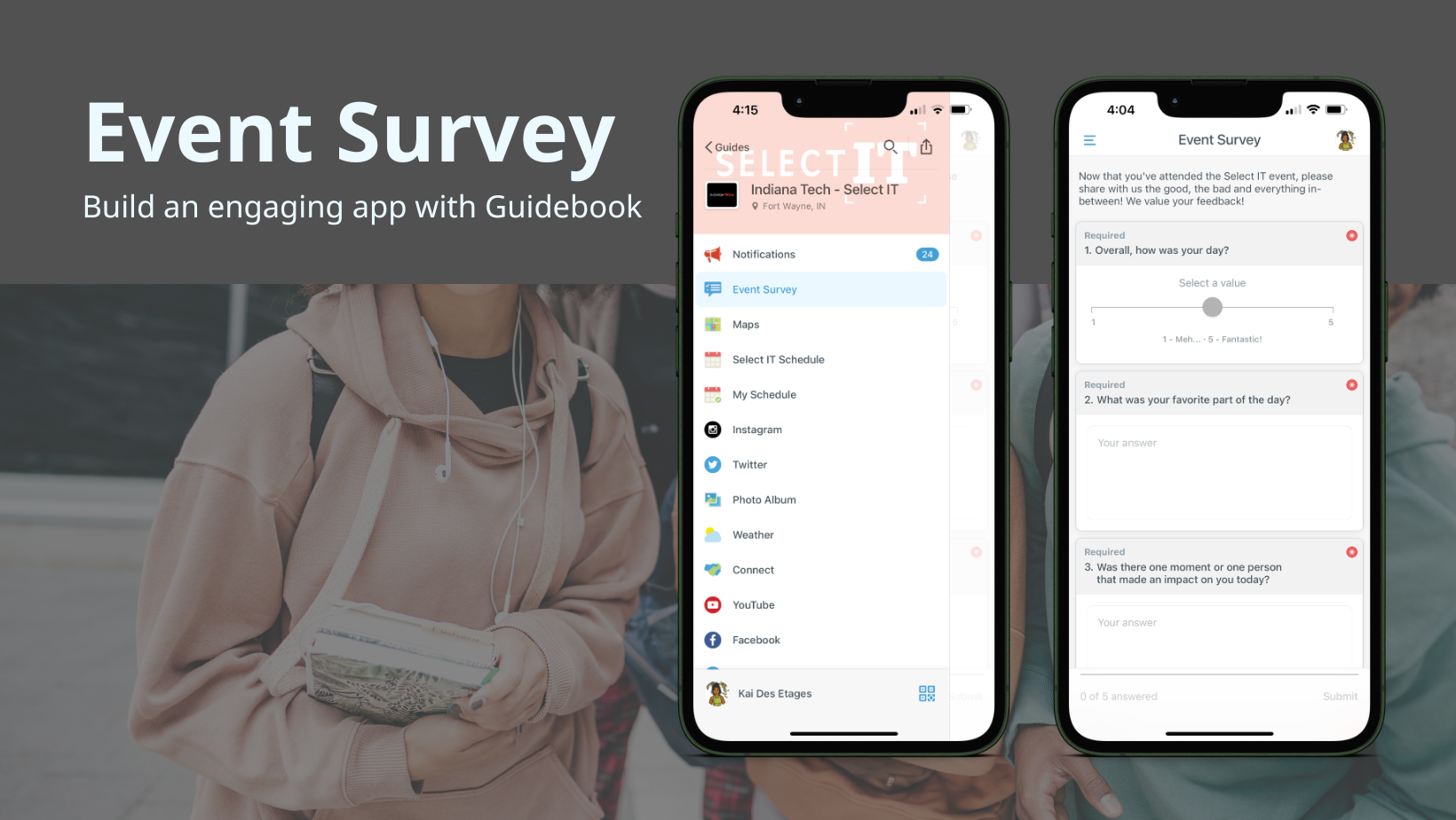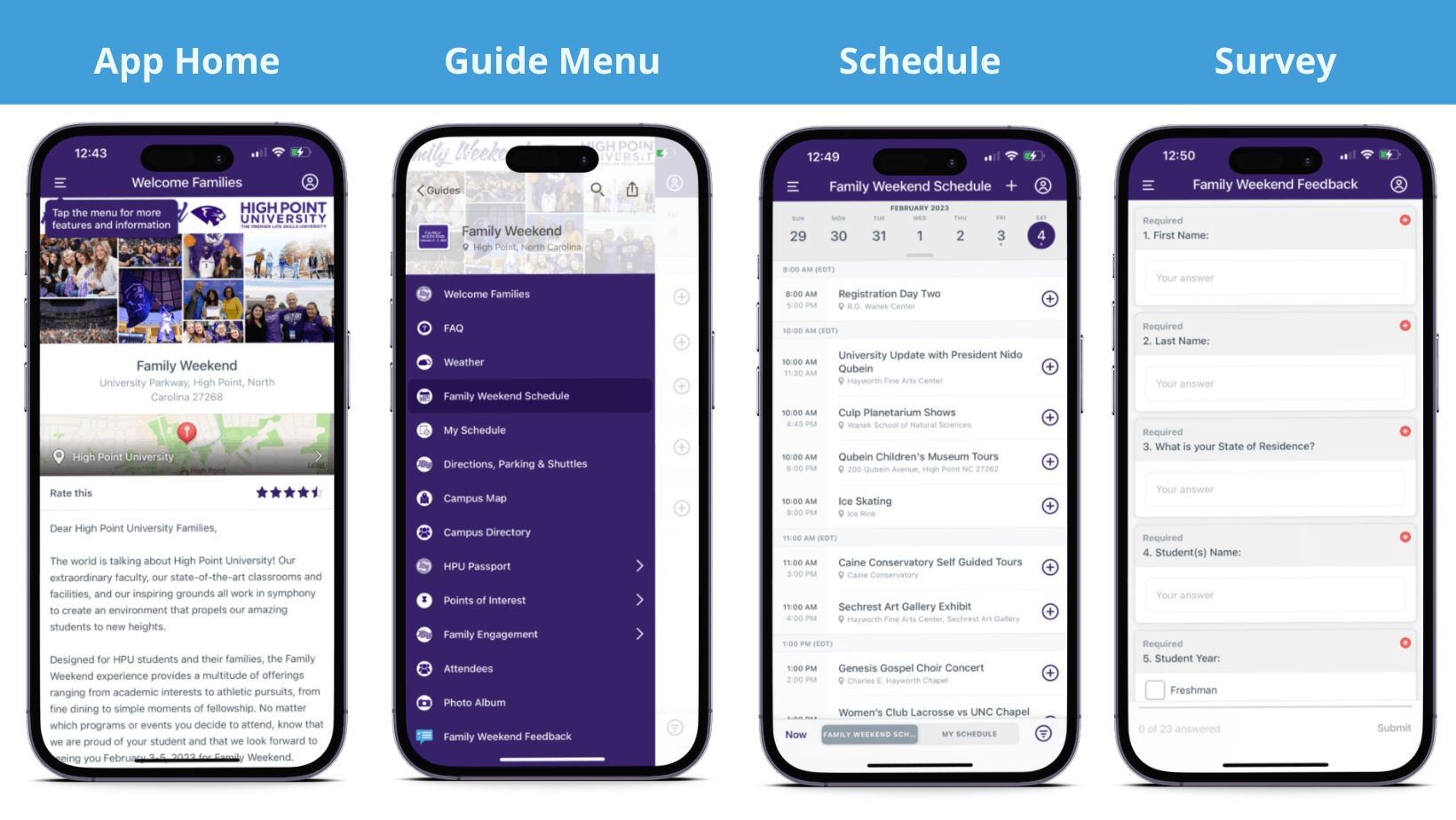Enhancing Campus Events with Surveys: A Guide for Higher Ed
When was the last time your university or college shared campus event surveys? Campus activities such as sports games, skills events, and career fairs enhance students’ overall college experience, contributing to their personal, academic, and social experiences.
Students from different backgrounds meet, socialize, and create meaningful relationships at these events. So, how can you ensure campus events are successful?
Given that campus events cater to people of different backgrounds, there is a requirement to satisfy all their needs. One proven way to understand what those are and make campus events more successful is by conducting comprehensive surveys.
The most effective way to gather information and engage your audience is through the following:
- Pre-event surveys
- Live polls
- Post-event surveys
Let’s dive in and see how you can use these effectively to enhance your campus activities.

What are Campus Event Surveys?
A campus event survey helps learning institutions collect valuable insights and suggestions from participants regarding their experience at the event.
Gathering feedback at your campus will enable you to assess the attendee’s satisfaction with the event, content, speakers, activities, and campus facilities.
An educational event survey will help you gain insights into the events that resonate most with the campus community so you can tailor future events accordingly.
Importance of gathering feedback in educational settings
Gathering feedback isn’t only important for campus events , it also serves as a mechanism for educators to gauge the effectiveness of their instructional methodologies and curriculum design. By soliciting input from students regarding their learning experiences, educators can discern areas of strength and weakness, enabling them to adapt their teaching strategies.
Gathering feedback in educational settings also helps guide institutional decision-making processes and drives organizational enhancements. This data-driven approach enables educational stakeholders to prioritize initiatives that foster student success and promote a learning environment conducive to intellectual growth and holistic development.
In this article, we’ll focus specifically on campus events and the various types of surveys that can be utilized to improve them.
Pre-event survey for campus activities
So, the campus event is a few weeks away, and you want to ensure that the event will be a success. We’ve got you covered – think about these three things to help make the event a success:
- Understand the audience, i.e., students, faculty, and staff, to curate a program that resonates with them, thus maximizing engagement and relevance.
- Design relevant questions for pre-event surveys to learn what the audience wants and expects.
- Use data from previous pre-event surveys to tailor event content and logistics.
- Use data from other sources, like a mobile event app with Guidebook, that can tell you what content was popular at previous events.

How to Create a Pre-Event Survey for Higher Education
As we have seen, a pre-event survey is critical to a successful event. So, how can you curate the perfect pre-event survey for higher education?
First, you should get the right survey tool.
Designing your survey or poll without being a coder is easy nowadays. With Guidebook you can master forms and create powerful, user-friendly surveys that can be completed on mobile or desktop. This type of event app survey tool is particularly valuableconsidering every campus student has a smartphone. Using an event app for surveys with additional features will ensure you get higher engagement, and more replies– as well as being a preferred method over paper surveys. Lecturers and support staff will also find it convenient to answer online pre-event survey questions that are short, simple, and concise.
Now, you must ensure that the survey effectively gathers relevant information from attendees. How do you do that?
To create a pre-event survey, we recommend that you:
- Determine what specific information you want to gather from attendees regarding planning and executing the event.
- Consider the demographics and characteristics of the audience, as this will help you tailor the survey questions accordingly.
- Design clear and concise survey questions and mix question types, such as multiple-choice, rating scales, and open-ended questions.
- Send out the survey and polls well before the event to give attendees sufficient time to respond.
Using Live Polls for Campus Event Surveys
Live polls are interactive polling activities conducted in real-time during events, presentations, or discussions. They give you a feel of the attendee’s experience as the event is going on.
Most learning institutions use event apps for live polls to collect participant data. The benefits of such apps include:
- Increased engagement: Live polls capture the attention of the campus attendees and encourage active participation by allowing them to contribute directly to the campus event.
- Real-time feedback: Campus event live polls provide presenters with immediate feedback on audience opinions and preferences. This instant insight allows presenters to adjust their content or address concerns as the event unfolds, enhancing the relevance and effectiveness of their presentation.
- Data collection: Live polls generate valuable data that can be used for analysis and decision-making to inform future presentations, events, or marketing strategies.
When educators use live polling technology in lectures, seminars, or workshops, they can gauge student understanding, assess learning outcomes, and tailor instructional content for the event to be beneficial.
Another benefit of live polling in campus events is that it encourages active learning by prompting students to engage with the event at hand, thereby promoting deeper comprehension and retention of key concepts.
Therefore, you must choose appropriate live poll survey questions to ensure engagement and feedback – and find a software that can make this easy for students and facilitators alike.

Post-Event Surveys for Campus Activities
These surveys enable you to measure your event’s success and develop better event marketing strategies for the future. Getting feedback from event attendees allows you to see what went well and what didn’t, and it can provide helpful suggestions that you wouldn’t get without asking. What’s also valuable is they will help you build trust with the attendees because they’ll see you value their opinions and input for future events.
Designing comprehensive post-event survey questions
Just like the pre-event and live poll surveys, designing a post-event survey requires carefully considering survey question types. It is important to mix closed- and open-ended questions. Keep in mind that open-ended surveys will enable attendees to give detailed opinions and suggestions, while close-ended surveys will only provide quantitative data.
Students want to be associated with learning institutions that are competitive and offer the best in terms of education quality and a supportive environment. That is why you must gauge their level of satisfaction after an event.
Here are examples of some post-event questions questions that can be used to shed light on their level of satisfaction:
- How satisfied are you with the overall experience of the concluded campus event?
- Which aspects of the campus event did you find most enjoyable?
- Which aspects of this event did you not appreciate?
- Do you anticipate attending another one of our events in the future?
- On a scale from 1 to 10, how likely are you to recommend the just-concluded event to a friend?
With the new in-app survey question features in Guidebook that allow photo and video uploads, date, email notification, and time, attendees will find it easy to share feedback, plan itineraries and get a copy of their responses.

How to Create a Post-Event Survey for Educational Institutions
Creating post-event surveys for educational institutions is as easy as:
- Selecting the right survey tool
- Crafting questions to assess learning outcomes, satisfaction, and engagement
- Deciding on timing and distribution strategies for post-event surveys
Let’s go through each of these steps in a bit more detail.
Selecting the right survey platform
- Your mobile app survey tool should be user-friendly to enhance the overall survey experience. This will lead to higher response rates from the attendees and you will benefit from more accurate data collection.
- It’s essential that the survey platform should be compatible with different devices and operating systems.
- Opting for a mobile app with a web version, where you can design your survey poll, enables back-office administrators to manage event data efficiently, send notifications, and customize information from any device with internet access.
Crafting questions to assess learning outcomes, satisfaction, and engagement
Campus event surveys should have questions that are short and easy to answer to increase the chance of participants replying. We emphasize using different types of survey questions to break the monotony and also offer participants a chance to express themselves fully, as in open-ended questions.
Survey questions regarding satisfaction can be presented on a numerical scale so the attendees can choose a scale to rate the event or provide qualitative feedback on what they liked or disliked about it.
When assessing learning outcomes, event survey questions should focus on the mastery of specific knowledge or skills taught during the event and how the event has contributed to their professional development or academic progress.
While crafting event app survey questions about campus event engagements, asking participants to reflect on their level of engagement with event activities and their willingness to participate in discussions or group activities will help you understand their expectations.
Deciding on timing and distribution strategies for post-event surveys
Now that you have your post-event survey questions ready, knowing when to distribute them is key. According to Survey Monkey, you should distribute post-event survey questions within 1-2 business days after the event, with Wednesday, Thursday, and Friday having a higher completion rate.

Successful Implementation of Campus Event Surveys
Example 1: Student orientation week
Student orientation week facilitates the transition of new students to the learning institution and prepares them for what they will encounter. The University of Minnesota uses pre-orientation surveys to gather information about the new students so that they can plan their orientation event to be all-inclusive.
Example 2: Faculty development workshop
A survey by Southeastern Louisiana State University in the early 1990s helped them understand the importance of using technology in teaching. This led to the faculty receiving grants for hardware and software, which significantly impacted the faculty’s needs.
Example 3: Alumni reunion event
Most campus institutions hold alumni reunion events. Newcastle University uses surveys to improve its services and events. The event survey they held in 2023 had massive feedback, and the management was able to ascertain that alums were very interested in keeping up with what was going on in the facility. The university management responded that they would send bi-monthly newsletters summarizing all events open to alums.
The survey also showed that alumns love on-campus events but were okay with virtual events. In response, the management indicated that they would incorporate both and post on YouTube so anyone could rewatch the events.
Conclusion
Pre-event surveys, post-event surveys, and live poll surveys are invaluable in enhancing the overall attendee experience in educational events. They let you know what attendees expect from the upcoming event and how they feel about it as it progresses. They also give feedback on what to improve to make campus events unforgettable.
Therefore, educational institutions must prioritize feedback and continuous improvement to ensure students enjoy these activities and get the most benefit from them. Since creating an event app survey is possible and easy, utilize their power to get accurate feedback about your campus events.


